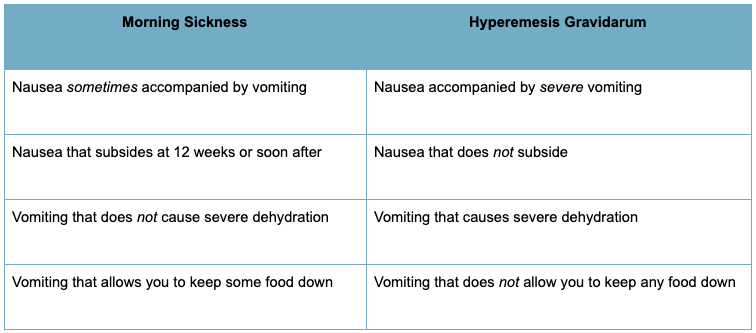An estimated 70-80% of pregnant women experience some type of morning sickness during their pregnancy, however, around 2% will experience severe morning sickness–a condition called hyperemesis gravidarum. The tricky thing is that what is considered “normal” morning sickness can be difficult to discern, particularly if it is your first pregnancy. Here are some indicators that can help you decide what’s normal and what’s not:
Morning Sickness vs. Hyperemesis Gravidarum (HG)

Source: American Pregnancy Association
What is hyperemesis gravidarum?
Hyperemesis gravidarum (HG) is a severe form of nausea and vomiting in pregnancy that is generally described as unrelenting, excessive pregnancy-related nausea and/or vomiting that prevents adequate intake of food and fluids.
Unlike morning sickness, HG usually extends beyond the first trimester. It may resolve by 21 weeks, but for some women, it may last for the duration of the pregnancy.
The cause of hyperemesis gravidarum is currently unknown but most theories indicate that it may be hormone-related. It is more common in multiple pregnancies (twins or more) and in women with migraines. Women with a family history of hyperemesis gravidarum or who had the condition in a previous pregnancy are much more likely to have it with future pregnancies.
Diagnosis and Treatment
There is no test to diagnose hyperemesis gravidarum. A diagnosis is usually made by measuring weight loss, conducting a urinalysis to check for ketones, and assessing the overall condition of the mother, including whether she is having difficulty performing her normal, daily activities.
Fortunately, there are medications and other treatment options available with the goal of reducing nausea and vomiting, replacing fluids and electrolytes, and improving nutrition and weight gain. In some cases, hospitalization for treatment may be necessary.
In severe cases or left untreated, HG is commonly associated with:
- Loss of greater than 5% of pre-pregnancy body weight (usually over 10%)
- Dehydration and production of ketones
- Nutritional deficiencies
- Metabolic imbalances
- Difficulty with daily activities
Other concerns include liver damage, jaundice, thiamine deficiency, preterm delivery, low birth weight, and the effects of excessive maternal weight loss and poor nutrition on fetal growth.
When to Seek Help
With no identifiable cause, researchers believe that although the condition is considered rare, hyperemesis gravidarum is likely underreported and undiagnosed. If you are unsure whether your symptoms of morning sickness are considered normal or severe, talk to your physician as soon as possible. Early intervention can help prevent the condition from becoming more severe.
The team of board-certified physicians at Raleigh OB/GYN have been caring for expectant mothers for more than four decades and are experienced in treating a variety of pregnancy-related conditions. To schedule an appointment, call (919) 876-8225.


